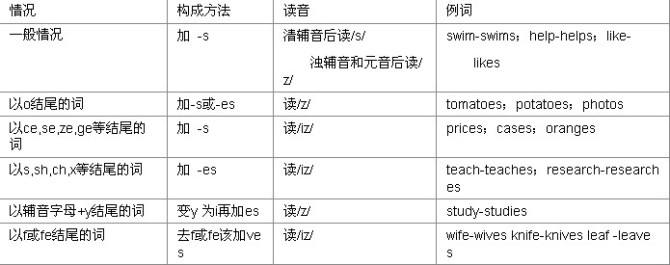定义
一般现在时。表示通常性、规律性、习惯性的状态或者动作(有时间规律发生的事件)的一种时间状态。
口诀
当主语是第三人称单数时
肯定句 主语+动词单三+其他
否定句 主语+doesn't+动词原形+其他
一般疑问句 Does+主语+动词原形+其他
肯定回答 Yes,主语+does
否定回答 No,主语+doesn't
特殊疑问句 特殊疑问词+一般疑问句
当主语不是第三人称单数时
肯定句 主语+动词原形+其他
否定句 主语+don't+动词原形+其他
一般疑问句 Do+主语+动词原形+其他
用错结构全句都错,一定要注意。
具体用法
表示
1.表示经常的或习惯性的动作,常与表示频率的时间状语连用。
时间状语:
always,usually,regularly,everymorning/night/evening/day/week,often,sometimes,occasionally,from time to time,twice a week,rarely,seldom,once a month, hardly, ever,never.
e.g. I leave home for school at 7:00 every morning.
.表示主语具备的性格、能力、特征和状态。
e.g. I don't want so much.
Ann Wang writes good English but does not speak well.
比较:Now I put the sugar in the cup.
I am doing my homework now.
3.表示客观事实和普遍真理。
e.g The earth moves around the sun.
Shanghai lies in the east of China.
4.在时间状语从句和条件状语从句中,常用一般现在时代替将来时。
5.表示预先计划或安排好的行为。
6.小说故事用一般现在时代替一般过去时。新闻报道类的内容,为了体现其“新鲜”性,也用一般现在时来表示过去发生的事情。
7.有些表示状态和感觉的动词表示现在发生的具体行为时,只用一般现在时,而不用进行时态。
8.表示现在发生的具体动作或存在的状态
9表示格言或警句中。
e.g Pride goes before a fall. 骄者必败。
☆注意★:此用法如果出现在宾语从句中,即使主句是过去时,从句谓语也要用一般现在时。
例:Columbus proved that the earth is round.. 第一句用一般现在时,用于操作演示或指导说明的示范性动作,表示言行的瞬间动作。再如:Now watch me, I switch on the current and stand back. 第二句中的now是进行时的标志,表示正在进行的动作的客观状况,所以后句用一般现在时。
一般现在时表将来
1)下列动词:come, go, arrive, leave, start, begin, return,live,fly的一般现在时表将来。这主要用来表示在时间上已确定或安排好的事情(即按照固定时间表将来发生的动作)。
The train leaves at six tomorrow morning. When does the bus start? It starts in ten minutes.
2)倒装句,表示动作正在进行,如: Here comes the bus. = The bus is coming. There goes the bell. = The bell is ringing.
3)在时间或条件句中。 When Bill comes (不是will come), ask him to wait for me. I'll write to you as soon as I arrive there.
4)在动词hope, take care that, make sure that等后。 I hope they have a nice time next week. Make sure that the windows are closed before you leave the room.
5).表示按规定、计划或时间表将要发生的事。
He starts next week. 他下个星期出发。
We leave very soon. 我们很快就离开。
The train starts at 10 o'clock in the morning. 火车将在早上10点开出。
这类用法限于表示“移动”的动词:go去,come来,leave离开,start出发,begin开始,arrive到达,take off起飞,等。
第三人称单数变化规律

一般现在时基本构成表

|